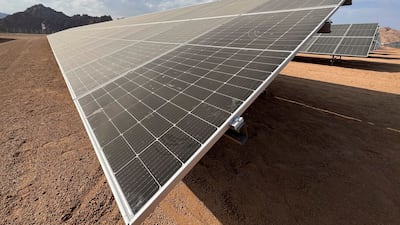More must be done to accelerate green investments in the Mena region and help it make a sustainable transition, climate advocates and business leaders said in Cairo.
Better investment will increase employment opportunities and boost economic development, Tarek Tawfik, chairman of the American Chamber of Commerce (AmCham) Mena Regional Council and president of AmCham Egypt, said on Sunday.
“Countries in the Mena region have taken proactive steps to advance green investments, adopt climate-change strategies and place sustainability and clean energy as their top priority, believing that sustainability investments will accelerate business growth,” Mr Tawfik told the one-day AmCham Mena Regional Council conference.
The event sought to build on what was achieved at the UN climate conference Cop27, hosted by Egypt, and the road ahead to Cop28, hosted by the UAE.
The council’s mission is to promote trade and investment between the US and Mena, comprising 4,000 members in 11 countries — Bahrain, Egypt, Jordan, Kuwait, Lebanon, Morocco, Oman, Palestine, Qatar, Tunisia and the UAE.
Green and sustainable finance in Mena more than quadrupled to $18.6 billion in 2021, from $4.5 billion in 2020, according to the council’s Mena-US Trade and Investment Report 2023.
However, about $230 billion still needs to be mobilised annually in the region for countries to achieve the UN Sustainable Development Goals.
Mr Tawfik quoted International Renewable Energy Agency figures that renewable energy jobs reached 12.7 million in 2021 and are expected to double in the next decade.
Mahmoud Mohieldin, the UN Climate Change High-Level Champion for Egypt and the UN Special Envoy on Financing the 2030 Agenda for Sustainable Development, said he was proud of the creation of the loss and damage fund at Cop27.
Loss and damage, the payment of reparations to developing countries by developed countries for the damaging effects of climate change, was a decisive issue at the conference.
However, he said “we need to do better”.
On a global scale, countries should be reducing emissions by 45 per cent from now until 2030, but instead are adding about 14 per cent.
Energy demand is expected to double and the region’s share in global oil production is expected to rise from 35 per cent to 44 per cent by 2030, he said.
“The Mena region is responsible for 8.7 per cent of global emissions and emissions, at this current pace, are expected to more than triple by 2060,” Mr Mohieldin said.
“We need to really capture it before it’s too late. If we are going to be late, as we are late in other parts of the world … the cost of dealing with the challenges is going to be multiples of what we see today.”
Private sector's role in a sustainable future
Globally, more than 62 per cent of climate finance is coming from debt instruments and in developing economies, the ratio is even higher than that, Mr Mohieldin said, warning “that’s not a sustainable model for funding”.
The opportunities for wind and solar energy in Mena are “enormous”, he said.
For example, the region receives 22 per cent to 26 per cent of the world's solar energy, which would meet half of global electricity needs.
Ambassador Mohamed Nasr, the lead negotiator for Cop27, said the role of the private sector was crucial in tackling climate change mitigation and adaptation.
“There are a lot of opportunities there. We believe that things are going in the right direction — not at the speed as envisaged and needed — but at least on the right track,” he said.
Sammy Bousaba, president of AmCham Dubai and vice chairman of the AmCham Mena Regional Council, highlighted the US-UAE Partnership for Accelerating Clean Energy (Pace).
The agreement signed in November has a goal to act as a catalyst for $100 billion in financing, investment and other support to generate 100 gigawatts of clean energy globally by 2035.
The Cop28 presidency will “carry the conversation forward” with plans for mitigation, adaptation, finance and loss and damage, Mr Bousaba said.
It will also mark the conclusion of the first global stock-take, a comprehensive assessment of the progress made in achieving the goals of the Paris Agreement.
Marty Durbin, senior vice president of policy at the US Chamber of Commerce and president of the Global Energy Institute, said there had been much more acknowledgement by governments of the important role the business community has played in recent years.
Noting the increased co-operation between the public sector and private sector in Egypt before Cop27, he said, “we’re seeing that same type of close co-ordination in the UAE already”.


